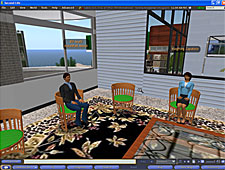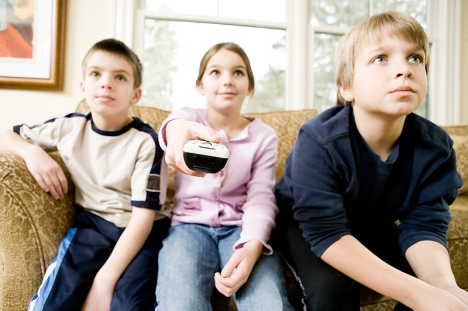
Credit: RTI International
The Avatar Diet: Does this Avatar Make My Butt Look Big?
Dr. Robyn Silverman
Trying to get rid of that belly fat? Looking to thin down those thighs? Want to straighten out your body image and “combat obesity” while looking at your computer screen? It’s time to join the virtual world!
If you were ever wondering if a vitual representation of oneself (Second Life) could really have any influence on the fitness or appearance of the actual person in real life, according to one study out of the Journal of Virtual Worlds Research, it can.
The researchers at RTI suggest that having a physically fit and thin avatar may just be the next thing to put this “obesity epidemic” behind us. I mean, who needs Atkins or South Beach when you can have The Avatar Diet? The researchers found that having a thin and physically avatar fit may encourage individuals to become healthier and more physically fit in their real lives. Yes– that’s right– people are more likely to engage in physical activities in their real lives if their avatars in Second Life engage in physical activities.
“Based on these preliminary results, it seems likely that virtual reality users may adjust their identity to be consistent with that of their avatars,” –Elizabeth Dean (research survey methodologist at RTI and the study’s lead author)
The results suggest that 80 percent of respondents who reported high levels of physical activity for their avatars reported participating in high levels of physical activity in their real lives. This is where it really gets strange for me though– this link is suggested to be causal (the avatar is thin which causes the person to go and get fit too)– rather than a simple correlation (the avatar is thin AND the person is thin). It seems logical that if someone was to make a representation of themselves, that if they were “fit” and going to the gym, they would make their avatar do so as well. It would “represent” them. Not sure where the causal link idea is coming in– especially because good research does not suggest causation– simply, correlations. But I digress…
Another aspect of the study showed that if the participants were interviewed by a thin avatar for this study rather than an obese avatar (this is just getting strange), the participant would be more likely to confess a higher BMI (Body Mass Index). In addition, almost 3/4 of participants, when interviewed by the thin avatar, told the interviewer that their avatar was also thin. But when interviewed by the obese avatar, only 1/3 of participants described their avatar shape as thin. Apparently, people like to bend the truth about their own bodies in Second Life around thin avatars. Geez. Just like high school again.
Interestingly, the virtual world is becoming a place where some health professionals are sending their clients for treatment. Since people are apparently influenced by their avatars, and want to live up to what they put out there in the virtual world, hanging out in Second Life could make a difference in one’s first.
Are they creating virtual gyms and virtual low cal meals too? This one remains to be seen. Considering that this study was only done with 27 participants (a very low research number which provides very low power to the results), we can’t totally buy what these researchers are saying. And of course there is the lingering question– does size really matter? Does it really have to?
But no doubt, people will give “avatar diet” a shot. No quick pill to lose weight this time– just a quick dose of Second Life.

Filed under: Body Image, Body Image Articles, Body Image Research | Tagged: Avatar, Body Image, Dr. Robyn Silverman, Journal of Virtual Worlds Research, media, obesity, Second Life, technology | Leave a comment »









